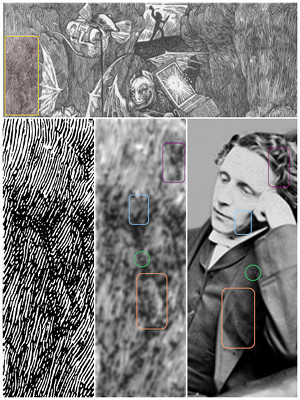Lewis Carroll
From The Art and Popular Culture Encyclopedia
| Revision as of 07:08, 27 February 2010 Goetzkluge (Talk | contribs) ← Previous diff |
Revision as of 07:10, 27 February 2010 Goetzkluge (Talk | contribs) (italics instead of quotation marks) Next diff → |
||
| Line 2: | Line 2: | ||
| [[Image:ShadowMarked300.jpg|thumb|left|300px|Comparison of a self portrait by Lewis Carroll (probably photographed by Lewis Carroll) and a segment of [[Henry Holiday]]'s illustration (1876, engraved by [[Joseph Swain]]) to the chapter ''The Beaver's Lesson'' in Lewis Carroll's ''[[The Hunting of the Snark]]''. (The picture in the lower middle is a low pass filtered version of the picture in the lower left corner.)]] '''Charles Lutwidge Dodgson''' ([[January 27]] [[1832]] – [[January 14]] [[1898]]), better known by the [[pen name]] '''Lewis Carroll''', was an [[England|English]] [[author]], [[mathematics|mathematician]], [[logic]]ian, [[Anglican]] [[clergyman]], and [[photography|photographer]]. | [[Image:ShadowMarked300.jpg|thumb|left|300px|Comparison of a self portrait by Lewis Carroll (probably photographed by Lewis Carroll) and a segment of [[Henry Holiday]]'s illustration (1876, engraved by [[Joseph Swain]]) to the chapter ''The Beaver's Lesson'' in Lewis Carroll's ''[[The Hunting of the Snark]]''. (The picture in the lower middle is a low pass filtered version of the picture in the lower left corner.)]] '''Charles Lutwidge Dodgson''' ([[January 27]] [[1832]] – [[January 14]] [[1898]]), better known by the [[pen name]] '''Lewis Carroll''', was an [[England|English]] [[author]], [[mathematics|mathematician]], [[logic]]ian, [[Anglican]] [[clergyman]], and [[photography|photographer]]. | ||
| - | His most famous writings are ''[[Alice's Adventures in Wonderland]]'' and its sequel ''[[Through the Looking-Glass]]'' as well as the poems "[[The Hunting of the Snark]]" and "[[Jabberwocky]]", all considered to be within the genre of [[literary nonsense]]. | + | His most famous writings are ''[[Alice's Adventures in Wonderland]]'' and its sequel ''[[Through the Looking-Glass]]'' as well as the poems ''[[The Hunting of the Snark]]'' and ''[[Jabberwocky]]'', all considered to be within the genre of [[literary nonsense]]. |
| His facility at word play, [[logic]], and [[fantasy]] has delighted audiences ranging from children to the literary elite. But beyond this, his work has become embedded deeply in modern culture. He has directly influenced many artists. | His facility at word play, [[logic]], and [[fantasy]] has delighted audiences ranging from children to the literary elite. But beyond this, his work has become embedded deeply in modern culture. He has directly influenced many artists. | ||
Revision as of 07:10, 27 February 2010
|
Related e |
|
Featured: |

His most famous writings are Alice's Adventures in Wonderland and its sequel Through the Looking-Glass as well as the poems The Hunting of the Snark and Jabberwocky, all considered to be within the genre of literary nonsense.
His facility at word play, logic, and fantasy has delighted audiences ranging from children to the literary elite. But beyond this, his work has become embedded deeply in modern culture. He has directly influenced many artists.
There are societies dedicated to the enjoyment and promotion of his works and the investigation of his life in many parts of the world including North America, Japan, the United Kingdom, and New Zealand.
His biography has recently come under much question as a result of what some call the "Carroll Myth."

